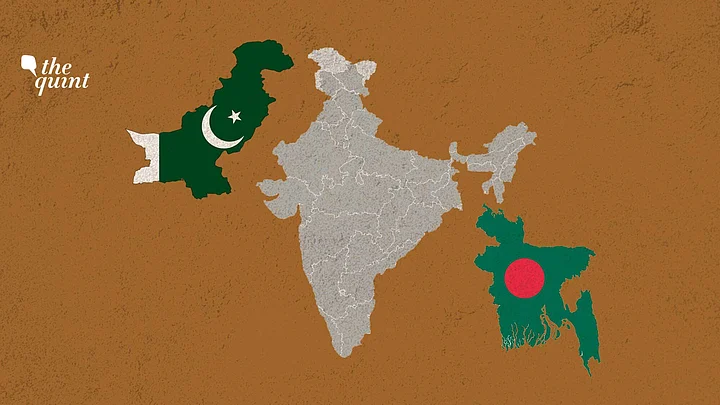A majority of Indians believe that Pakistan hasn’t learnt any lessons from its military defeat of 1971, when India's victory in the Indo-Pak war had paved the way for the formation of Bangladesh from a territory that had hitherto been considered as East Pakistan.
The results of a nationwide poll by CVoter, conducted on the occasion of 50th anniversary of the Bangladesh Liberation War of 1971, show that over a third of Indians believe that Pakistan has become more dreadful and revengeful towards India since the defeat.
Here is what the survey has gauged about Indians' sentiments towards Pakistan, Bangladesh, and the changes of the last 50 years in the same context.
35 Percent Indians Say Pakistan Has Become More Vengeful Since Creation of Bangladesh
35 percent of those surveyed opine that Pakistan has become more vengeful and dangerous since its it lost its war with India in 1971, leading to the creation of Bangladesh.
On the other hand, when asked "Did Pakistan learn any lessons from the humiliating military defeat of 1971?" 21.8 percent respondents affirmed that it had.
While 15.4 percent of the voters said that Pakistan had learn just a few lessons, 27.7 percent said it had learnt nothing.
Can Pakistan Have Good Relations With India? And What About Pakistan-China?
The survey results further revealed that a majority of Indians are of the view that India and Pakistan will continue to have strained relations in the future.
During the survey, while 37.1 percent of the respondents said that they are not optimistic but are hopeful about Pakistan having better relations with India in future, 21.9 percent opined that the relations between the two nations will worsen. 18.4 percent of those who responded said that they expect to see no change in the Indo-Pak equation.
On the other hand, 22.6 percent of those who were interviewed during the survey expressed optimism about the international relations.
When asked if the Pakistan-China axis could prevent the rise of India as a world power, 38.6 percent respondents said that they will try but fail. While 20 percent of those surveyed believed they would partially succeed, 22.2 percent affirmed that it they would be successful.
19.2 percent Indians opined that internal divisions will be more harmful for India than the China-Pakistan axis.
Voters Divided on Whether Creation of Bangladesh Has Helped India
When asked if the creation of Bangladesh has helped Indian in any significant way, 29.5 percent respondents said that the creation of the nation had helped a lot.
While 20.8 percent of the respondents said that it had helped a little, 23.7 percent said it had made no difference, and 26 percent said that it had actually harmed India.
Nearly 40% Indians Believe That the Indian Army Has Improved its Standards Since 1971
39.3 percent of those surveyed believe that the Indian Army has not only maintained the finest standards exhibited in the historic 1971 war, but has further improved its professional qualities.
As many as 34.4 percent of the respondents opined that the armed forces have completely maintained its standards.
However, 7.5 percent of the respondents said that professional standards of Indian armed forces have deteriorated in the past 50 years.
Meanwhile, 18.7 percent of those who participated in the opinion poll felt that Indian armed forces were falling victim to politicisation.
India Has Never Seen a Coup, Thanks to Its Military Leadership: 1/3 Respondents Agree
Almost a third of the respondents – 31.1 percent – opined that India has never witnessed a military coup unlike neighbours Pakistan and Bangladesh, thanks to the professional military leadership of the country.
Merely 18.2 percent respondents believed that the credit for the same lay with the political leadership.
Another 15.5 percent of those who participated in the opinion poll were of the view that public sentiment was the key reason for India never seeing a military rebellion.
35.5 percent of the respondents stated that all the three aforementioned factors are responsible for India not having such a coup.
Islamic Fundamentalism, Better Prospects in India Have Led Bangladeshi Hindus to Migrate, Say Indians
A majority of Indians believe that the rise of Islamic fundamentalism in Bangladesh and better prospects in India are major factors that have led to the dwindling in the population of Hindus in the 50-year-old country.
While merely 12.1 percent of the voters felt that persecution by the majority had led Hindus to migrate to India, 29.2 percent of the respondents believe the rise of Islamic fundamentalism as the key reason for the steady fall in Hindu population in Bangladesh.
Further, 24.2 percent of those surveyed cited the better prospects offered by India as the reason for the migration.
34.5 percent of the respondents said that the all the aforementioned factors have led to the decline of the Hindu population in Bangladesh.
Additionally, a large number of Indians indicated that people from West Bengal will never migrate to Bangladesh, despite the latter country having a higher per capita as compared to India, and better Human Development Indicators.
While as many as 37.5 percent of the respondents said that they don't think that residents of West Bengal will migrate to Bangladesh for jobs, 8.5 percent said that they can envisage such a future.
(At The Quint, we question everything. Play an active role in shaping our journalism by becoming a member today.)
